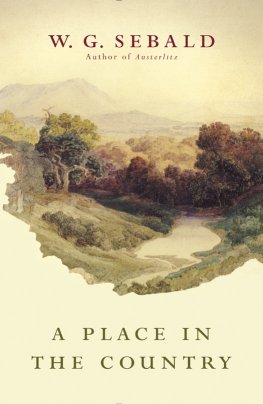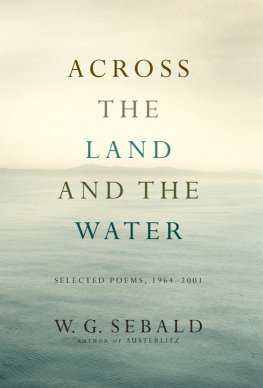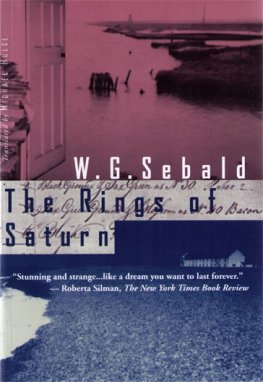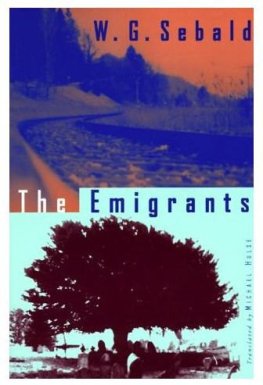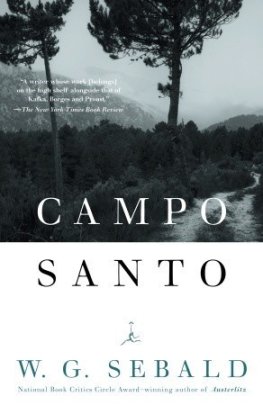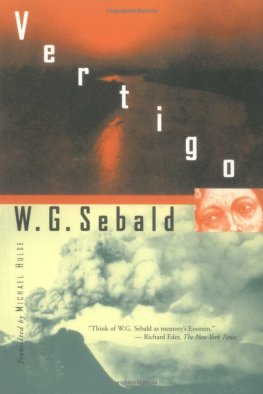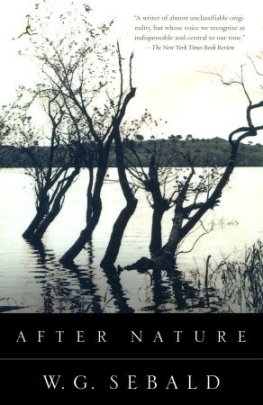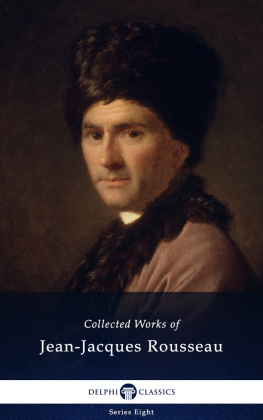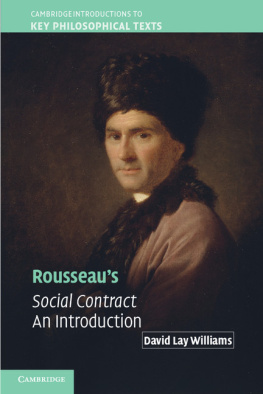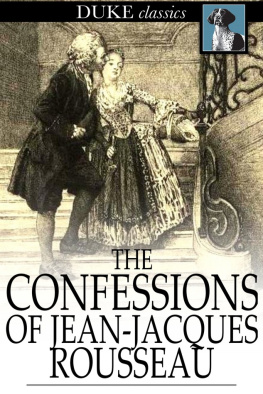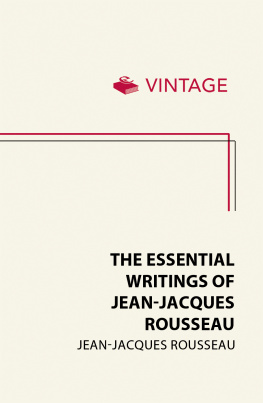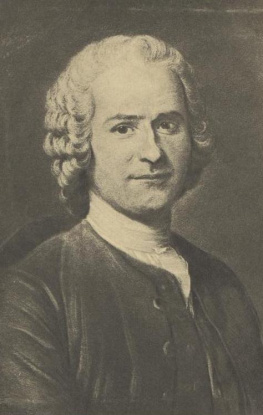W. G. Sebald
A Place in the Country
Since then I have slowly learned to grasp how everything is connected across space and time, the life of the Prussian writer Kleist with that of a Swiss author who claims to have worked as a clerk in a brewery in Thun, the echo of a pistol shot across the Wannsee with the view from a window of the Herisau asylum, Walsers long walks with my own travels, dates of birth with dates of death, happiness with misfortune, natural history and the history of our industries, that of Heimat with that of exile. On all these paths Walser has been my constant companion. I only need to look up for a moment in my daily work to see him standing somewhere a little apart, the unmistakable figure of the solitary walker just pausing to take in the surroundings.
What W. G. Sebald writes here, relating his first encounter with Robert Walsers short text on the dramatist Heinrich von Kleists trip to Switzerland, Kleist in Thun, not only sets out in nuce his sense of affinity with Walser indeed with all of the writers he discusses in this volume, to whom he wishes, as he claims in the Foreword, to pay my respects before, perhaps, it may be too latebut also seems to encapsulate the themes and preoccupations of this collection as a whole. That these themes and preoccupations overlap with those of Sebalds own creative works of prose fiction (as he terms them)Vertigo, The Emigrants, The Rings of Saturn, and Austerlitzis surely no coincidence, in view of the fact that the first three of these works already enjoyed considerable success at the time he composed the main part of these essays in 1997.
A Place in the Country was first published in German in 1998 under the title Logis in einem Landhaus (the title itself a quotation from Walsers Kleist in Thun), which might be translated literally as lodgings in a country houseor house in the country. Shortly before that, Sebalds previous book, The Rings of Saturn, had appeared in English translation, having been published in German in 1995. In the meantime, following a visit to Corsica, he had commenced work on a book project relating to that island (which was, of course, the birthplace of Napoleon), a venture subsequently abandoned in favor of Austerlitz: extracts from the Korsika-Projekt, most of them previously published, appeared posthumously as essays in the volume Campo Santo. Traces of this Corsican project surface in the essays on Walser and Rousseau, as a kind of counterpoint to the le Saint-Pierre, and it is tempting to conjecture that the essay on the philosopher from Geneva at least derives in part from that abandoned project. An interest in locality, then, notably rural and island locality, with its suggestions of being far from home, is a consistent feature of Sebalds work, and in these essays, with their loose structuring around an Alemannic region comprising southwest Germany and northwest Switzerland and Alsace, we may detect something of a ritorno in patria, a kind of literary homecoming, after the English pilgrimage of The Rings of Saturn, to the Alpine regions and their hinterlands traversed by the various protagonists of Sebalds first prose work, Vertigo. It is fitting, then, that the best-known of the Corsican essays in Campo Santo is entitled The Alps in the Sea.
The six essays in the present volume have as their subjects six artists and writers, spanning, as the Foreword has it, a historical period of almost two hundred years, from the Enlightenment and Romanticism in the eighteenth century culminating in the French Revolution and the Napoleonic Wars via Biedermeier quietism, the upheavals of 1848, the industrialization and colonialist expansionism of the nineteenth century, and the two world wars of the twentieth; and although the rural idylls and writers retreats they evoke might appear far removed from such historical turbulence, the seismic effects are registered even in the remotest of areas, among which one must count Sebalds native Allgu. This mountainous region on the border with Austria belongs culturally and linguistically (as the name indeed suggests) to the Alemannic area, referring to the group of dialects still spoken there, a direct descendant of the Middle High German of the Minnesngereven though the region is administratively now part of Bavaria rather than Baden-Wrttemberg. While Johann Peter Hebel (17601826) comes from the Basel hinterland (in Baden), Eduard Mrike (18041875) spent his life in the environs of Stuttgart in Swabia (Wrttemberg), and Sebalds contemporary from the Allgu, the artist Jan Peter Tripp, now resides as an earlier draft of the Foreword pointed out in a Landhaus across the Rhine in Alsace. The other three authors are all Swiss, but here, as in Vertigo, the Alps which these regions border function not as a dividing but a unifying feature, so that the philosopher Jean-Jacques Rousseau (17121778), across the linguistic boundary in Geneva, is linked to the Zurich-born Gottfried Keller (18191890) and the peripatetic Robert Walser (18781956) both writing in German via the topography of the le Saint-Pierre in the Lac de Bienne (or, as it is known in German, the St. Petersinsel in the Bielersee) itself part of a bilingual region, and in many ways the heart of the book.
This intersection of languages and cultures in what is after all a region of many borders and transitions is reflected, too, in the fabric of Sebalds text, where, in keeping with the characteristic features of his creative prose, his carefully crafted German sentences are shot through with quotations and allusions, some French, some English, some even in Hebels Alemannic dialect. There is, too, a hidden trajectory in the arrangement of the essays (which in this translation follows Sebalds own, not quite chronological, order in the German original). If it is from Fribourg, in French-speaking Switzerland, that the young student Sebald sets out for Manchester in the autumn of 1966, symbolically placing Hebels Schatzkstlein, Kellers Der grne Heinrich, and Walsers Jakob von Gunten in his suitcase, then it is initially from Germany, or its southernmost tip, the Allgu, that his journey far from home begins. His first studies are in Freiburg im Breisgau, in Baden: the choice of a university in an Alemannic area, rather than the arguably more obvious choice of the Bavarian capital, Munich, seems significant. In moving away from the dialect world of the southern Allgu, with its Alemannic roots and inflections fondly remembered from his grandfather, whose use of language, as he writes, was in many ways reminiscent of that of the Hausfreund (i.e. Johann Peter Hebel), he finds himself in the university environment of Freiburg, where, as he claims, only partly ironically, he had to learn to speak Hochdeutsch for the first time. From there he leaves Germany for the Universit de Fribourg, in the French-speaking part of Switzerland not far from Biel/Bienne (Robert Walsers birthplace) and the le Saint-Pierre and thence, as he tells us, to England, returning a year later to spend a year teaching in a private school at St. Gallen in Switzerland, close to the asylum at Herisau where Robert Walser spent his final years.
W. G. Sebalds unwavering affection for these authors, though, is not mere nostalgia, or a longing for a return to more innocent times. Not only are their inflections, whether peripheral South or Swiss German or Swiss-accented French, ones familiar to Sebalds ear, like the distinctive regional coloring of Hebels prose, or the sheer quirkiness and inventiveness of Walsers use of language; so also are the crafting of the sentences, the unrolling of the narrative path, as he writes of Kellers Der grne Heinrich, sentence after lovely sentence, and the poetic breaths and cadences of that prose, which attract his attention both as a critic and a writer, as he explains to Michael Silverblatt in Los Angeles in one of his last interviews:

